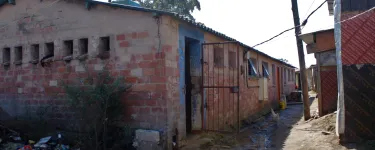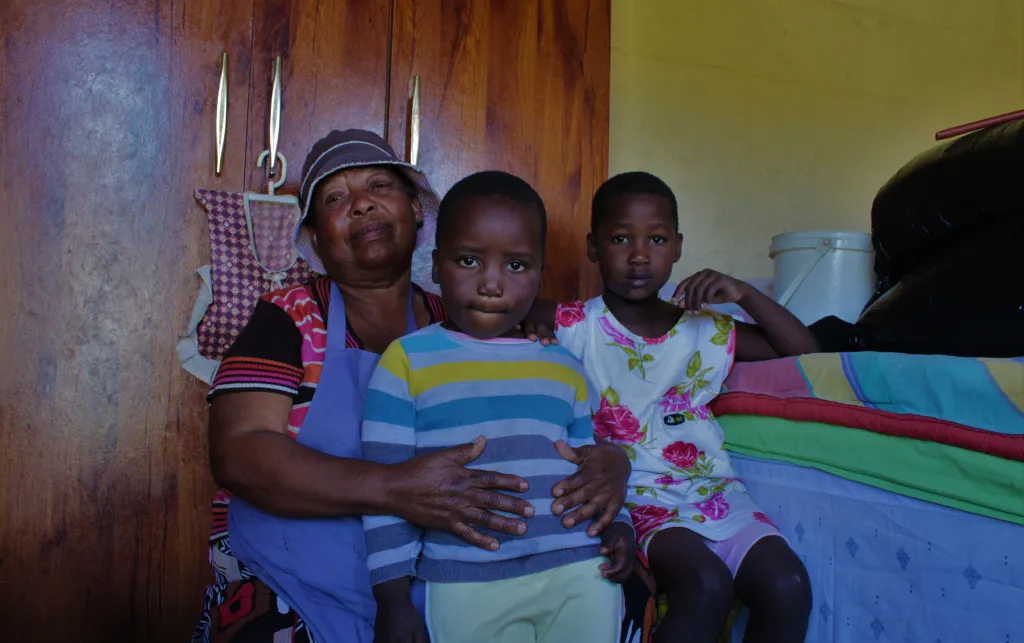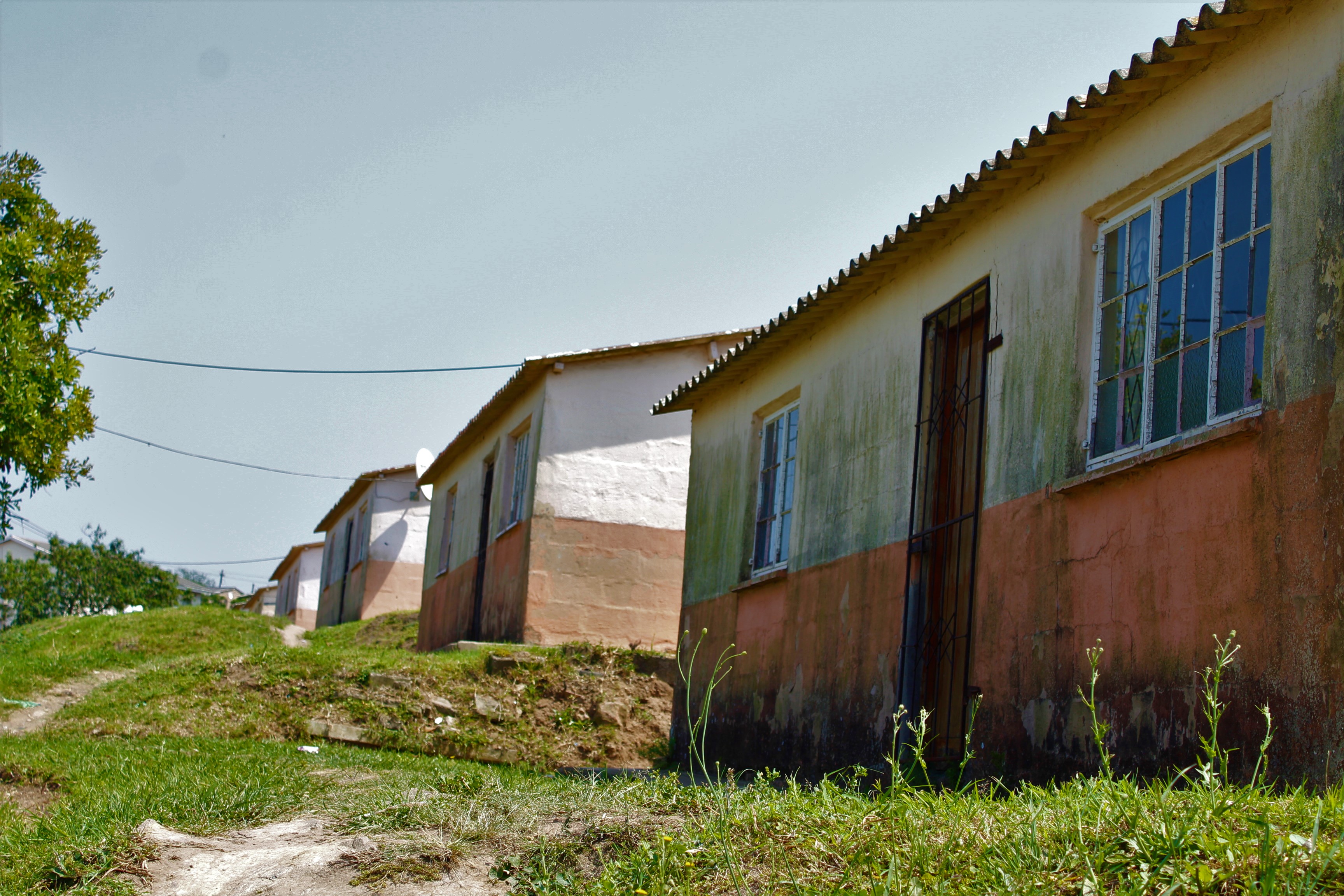Hostel dwellers face coronavirus, hunger, and the legacy of apartheid

These large, often dormitory style, buildings were created to cheaply accommodate single, male, migrant workers from rural areas to mines and later cities. The hostel system enabled the apartheid state to exploit black African workers whilst also denying them a permanent, dignified place in the life of the city. Over a quarter of a century since the end of apartheid, the promises of housing, water, electricity and other basic amenities and the eradication of the spacial separation of rich and poor, black and white are yet to be fulfilled – as seen starkly in the hostels.
Successive governments pursuing neo-liberal economic policies have failed to transform hostels or offer decent work and housing. Instead, hostels are still home to tens of thousands of people, living in some of the worst housing conditions with the highest rates of unemployment.
In Durban, War on Want’s partner Ubunye Bama Hostela is a movement of hostel dwellers who continue the struggle for the rights and decent housing for hostel dwellers. South Africa has introduced some of the toughest lock-down restrictions in the world to try to contain the spread of Covid-19. In this article, local journalist Nomfundo Xolo speaks to members of Ubunye about how the Covid-19 pandemic is affecting people in hostels and their demands for government action to address the increasing threat of hunger that many face.
Independent journalist Nomfundo Xolo reports from Durban.
The hostel dwellers movement in Durban
Uncertainty looms for hostel dwellers as South Africa observes the extended lockdown, imposed to curb the spread of the Covid-19 virus.
South Africa has 3,465 confirmed positive cases with 58 deaths due to the Covid-19 global outbreak (as of 21 April 2020).
Thousands of families in hostels, living in poverty and poor housing, have been forced to choose between hunger and risking their wellbeing.
The hostel dwellers movement based in Durban, Ubunye BamaHostela (UBH), is demanding that the municipality provides social protective measures for families in hostels. Established in 2005, UBH represents thousands of hostel residents in KwaZulu-Natal (KZN), and advocates for their recognition and social justice. UBH chairperson, Vusi Zweni, argued that the effectiveness of the lockdown depended on proper housing, sanitation and healthcare – a far cry to millions of poor South Africans:
"Many hostel dwellers are domestic servants, street traders, students and much more are unemployed. We have already seen devastating effects as the government continues to sideline the poor. Hostels house families, women and children, in cramped spaces. Ideally during the day you would not find them at home because of work and school, but now the reality is staring at us.
"There are households of up to 15 members living in one bedroom, with three other families with the similar conditions next door. The living conditions do not allow for an effective lockdown. Poverty then becomes more frightening than the threat of this deadly virus. We therefore continue to demand improved living conditions and social justice within our hostels."
Chairperson and founding member of UBH’s Women’s Forum, Busisiwe Ntombela, says the lockdown has exposed the absence of interventions for vulnerable households such as those living in extreme poverty in hostels.
Ntombela has lived in KwaMakhutha hostel in south Durban for more than 30 years. Each room in the hostel houses a different family. She says:
"Hostels will directly experience the disastrous effects that the rapid spread of Covid-19 continues to have on poor South Africans. The state of healthcare coupled with the living conditions of hostel residents places us at a vulnerable position. Choosing between making ends meet and your well-being is now the struggle."
Hostels in Durban still display the harsh historical features of influx control and migratory labour. The walls, hallways, and the shared compact rooms, still expose an era when permanent residence for black workers was prohibited by the Group Areas Act of 1950.
Ntombela visits families at the hostel to assess the effects caused by the loss of income due to the pandemic. The same message echoes in each house: the threat of the virus pales against the threat of dying from hunger.

One resident said her family’s livelihood depended on the money she made through recycling cans and glass. She continued, in frustration:
"Hunger will kill us before the virus does. We survive on R20 a day (£0.88) a day and without anything coming in, we are afraid our children will die from hunger. I am supposed to take my medication with meals, but how will I do that without any food?"
About 40 km away from KwaMakhutha, KwaMashu Hostel is home to thousands of people. An informal settlement has grown up a few metres away from it, because the hostel was never intended to accommodate settled families, so now shacks are the only option for them.
You don’t have to look hard into the congested hostel complex to find dilapidated buildings, blocked sewers and restricted access to ablution facilities and water – blatant human right violations.
Resident Muziwokuthula Ngidi (54), has been living in KwaMashu for 30 years. He came to the hostel from KwaMaphumulo, north of KwaZulu-Natal. He succeeded his father, who also came to find work. Ngidi says he fears the disrepair, unserviced toilets and blocked sewage drains will worsen the spread of the Covid-19 virus. He said:
"New generations are being born and bred here, in a place hard to call home. It is highly unsafe for children, and sadly their future is dim. The government has neglected the hostel. They do not regard us as a community deserving of dignified homes and functioning public basics such as toilets and waste collection.
"What future can a child have if they live and play in a place filled with filth and waste at their doorstep? Hostels no longer serve the purpose they were established to fulfil. There are less to no job opportunities now, yet families continue to grow. The development of this place needs to cater for this important factor. But development is still a far-fetched dream."
In the middle of KwaMakhutha and Kwamashu lies Glebelands hostel. Officially, 22,000 live here, but the reality is probably closer to 30,000. The tension here is stronger than the high, aged, red brick walls – the consequence of a past fuelled by displacement and politics. The rooms are packed more than usual due to the lockdown. Here too people have begun to worry as lockdown regulations prevent many from working.
KwaMakhutha, KwaMashu and Glebelands Hostel share similar dynamics. Since they came into existence, hostels have housed many people from rural areas who would come to Durban to seek employment. After years, some would retire and go back home, some leaving their children to take over the beds.
Announcing the 21-day lockdown, now extended to 30 April 2020, President Cyril Ramaphosa stated that this was a "decisive measure to save millions of South Africans from infection”. He added, “while this measure will have a considerable impact on people’s livelihoods, on the life of our society and our economy, the human cost of delaying this action would be far greater".
But it’s the poor who are bearing the brunt of the "considerable impact".

A 26-year long wait
On Human Rights Day last year, Ubunye BamaHostela, marched to Durban City Hall to deliver a memorandum on the hostel dweller’s grievances. As for many years they again demanded that eThekwini Municipality and the Department of Human Settlement improve the hostel’s living conditions, improve safety and address the slow progress on hostel upgrade projects.
Vusi Zweni said at the time:
"The post-apartheid transition of hostels has seen hostels in a state of perplexity. It is all still dreams and promises. As more families are born into the hostel, the vicious cycle continues. Unemployment is peaking, intensifying living struggles. The government seems to ignore hostels and the lives of hostel dwellers, quite deliberately."
In 2013, KwaZulu-Natal former Premier, Senzo Mchunu announced that R184 million was allocated for hostel upgrades. KwaMakhutha, Glebelands and KwaMashu were among the hostels included in this budget.
Glebelands received intense scrutiny after former Public Protector Thuli Madonsela visited the hostel in 2015 following reports of inhumane living conditions, irregular expenditure and the political killings in KZN linked to the hostel.
But today, many hostel dwellers still wait to see basic repairs done, let alone comprehensive upgrade projects on the scale needed.
Nomfundo Xolo
Blaqtivity
Covid-19 and South Africa’s lock-down in an attempt to control its spread has exposed the neglect of hostel dwellers and the vital importance of the ongoing struggle by hostel dwellers against poverty, inequality and the legacy of apartheid. This is why War on Want is committed to the struggle of our partner, Ubunye Bama Hostel. We will continue to stand in solidarity with them, shining a light on their power and their fight so that they will never be made invisible.